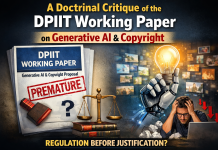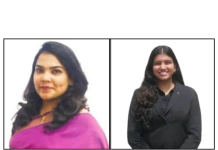We are pleased to bring to you our next guest post by Ujjawal Bhargava, fourth-year student of the Institute of Law, Nirma University, Ahmedabad. Ujjawal has a keen interest in the subject of Intellectual Property, specifically copyright and trademark laws. He has written for us earlier here and here.
INTRODUCTION
Recently, the Indian Group of the International Association for Protection of Intellectual Property (“IAPIP”) filed a miscellaneous application in the Supreme Court of India through which directions were sought to extend the tenure of the incumbent Chairperson of the Intellectual Property Appellate Board (“IPAB”), Justice Manmohan Singh and to allow him to hold the position of the Chairperson, till a new chairperson for the IPAB is appointed.
Arguments Advanced
For the Applicant
The applicant, IAPIP argued that the term of the incumbent chairperson should be extended owing to the fact that his appointment was made under Section 89A of the Trademarks Act, 1999 (“TM Act”). Section 89A was inserted through Section 161 of the Finance Act, 2017. Section 89A begins with a ‘non-obstante’ clause (overriding Section 86 which prescribes the maximum age of the chairperson to be 65 years) and stipulates that the term of the appointments of any member to the IPAB, after the date of commencement of the Finance Act shall be governed by Section 184 of the Finance Act, 2017. Section 184 of the Finance Act, 2017 prescribes the outer age limit of the chairperson to be 70 years. They further contended that the Supreme Court in Rojer Mathew directed that the appointments made prior to the 2017 Rules shall be governed by the parent act (In this case, the TM Act). Thus, the outer age limit in the TM Act is 70 years, the age of 65 years contemplated under Section 86 cannot apply.
Furthermore, while relying on Section 84(2) of the TM Act, the applicant argued that the incumbent chairperson shall be allowed to continue to hold the position of Chairperson on the ground that there can be no bench without a judicial member. They further argued that at the moment there is no other judicial member present in the IPAB, but only technical members are present. Furthermore, even the position of Vice-Chairperson is vacant, who in the absence of the Chairperson officiate as the acting Chairperson (Section 87 of the TM Act).
For the Respondents
The respondents, however, urged that the directions sought by the applicant should not be granted by the Court. They argued that Section 184 of the Finance Act, 2017 does not ipso facto prescribe the tenure of the chairperson, rather it only enumerates the outer limit of the tenure and maximum age for the chairperson to hold office. Further, it leaves the matter on the Central government to frame rules. The Central government framed the Tribunal Rules, 2017, however, these rules were held to be unconstitutional in the case of Rojer Mathew v. South Indian Bank Ltd. Notably, the Supreme Court in the said case specifically stated that since the 2017 rules are unconstitutional, the tenure and appointment have to be governed by the parent act. Since the TM Act prescribes the outer age limit for a Chairperson to be 65 years (Section 86), the tenure cannot be extended.
Holding of the Court
The Supreme Court while rejecting the applicant’s argument that owing to the decision of Rojer Mathew, the appointments made prior to the 2017 Rules were governed by the parent act observed that the Rojer Mathew case was decided on 13.11.2019, however, the tenure of the incumbent chairperson ended on 21.09.2019. Furthermore, the only arrangement regarding the term of office of the chairperson between the 2017 Rules and the Rojer Mathew case was the interim order provided in Kudrat Sandhu v. Union of India. The interim order prescribed the age of superannuation of a Chairperson to be 65 years. Further, the Court accepted the respondents’ argument that Section 89A of the TM Act only prescribes the outer age limit of the chairperson and leaves on the government the duty to make rules for the term of office. The government formulated the 2017 Rules prescribing the term of office for 3 years, however by the time these rules were declared unconstitutional, the tenure of the incumbent chairperson ended on 21.09.2019.
While dealing with the applicant’s second argument that no member can function as the Chairperson as no other member in the IPAB is a Judicial Member observed that there is no bar for a technical member to become a chairperson, provided he or she has held the office of the Vice-Chairperson for at least two years (Section 85).
ANALYSIS OF THE DECISION
The order given by the Supreme Court that the tenure of the incumbent chairperson, Justice Manmohan Singh cannot be extended is accurate and has left no scope for doubt regarding the interpretation of the existing precedents and rules that have to be followed regarding the tenure of the chairperson. The incumbent chairperson was given the said position vide an order dated 20.07.2017. The order said that Justice Manmohan Singh shall hold the office of the Chairperson for a term of three years or until further orders, whichever is earlier. This order also raises certain questions, however, they are not to be dealt here. The order of appointment was amended on 29.12.2017 stating that the tenure of the appointment of Justice Manmohan Singh was upto 21.09.2019 (the age of superannuation, 65 years of the incumbent chairperson). According to the said order the tenure of the incumbent chairperson had ended on 21.09.2019, which the Court observed in its decision.
Further, the Court was correct in rejecting the applicant’s argument that the judgment of Rojer Mathew, would apply on the present case. This is because the tenure of the chairperson ended on 21.09.2019 and the judgment in Rojer Mathew was given on 13.11.2019. Even if this judgment would have been applicable, the tenure would have been governed by the parent act, the TM Act, till new rules are farmed. Notably, the Court has also cleared the ambiguities regarding which section to be followed in this regard. Section 89A provides that Section 184 of the Finance Act, 2017 has to be followed. Section 184 stipulates that the government has to frame rules regarding the tenure and age limit, however, it prescribes the maximum age limit of 70 years that can be specified in these rules (Proviso to Section 184). Since it only prescribes the outer limit that have to be followed while making the rules, it cannot be followed until new rules are not formulated. Thus, Section 86 of the TM Act has to be followed which prescribes the maximum age limit to be of 65 years (the argument raised by the respondents). Consequently, even if the judgment of Rojer Mathew was to be followed, the tenure of the incumbent chairperson would still end on 21.09.2019.
It is pertinent to note here that by the tenure of the incumbent chairperson ended on 21.09.2019 wide order dated. However, the Supreme Court on an application by IAPIP extended his tenure for a year in December 2019 till September 2020. Later this term was further extended by the Apex Court until 31.12.2020. Interestingly, the decision of the Apex Court in the present case is complete in the sense that it has cleared all the doubts regarding the tenure of a chairperson. However, since this application for extension was filed on 05.12.2020, 26 days prior to the retirement of the incumbent chairperson, and was dismissed on 12.02.2021, around 45 days after the date of retirement on the Court could have clarified as to what will happen to the judgments rendered by the Chairperson after his tenure ended on 31.12.2020. Thus, it has to be seen that what shall be the fate of the matters that have been disposed or even heard by the incumbent chairperson after his tenure ended. The Supreme Court may have to take certain legal action so as to throw some light on this question. Moreover, another pertinent question is what is the authority, by which the incumbent chairperson has been hearing the matters as recently as 16.02.2021 (refer to the cause list), even when the Apex Court has not extended his tenure?
Lastly, the Apex Court held that there is no bar on the technical member to be a Chairperson of the IPAB. The Court articulated this according to Section 85 of the TM Act which states that a person can become a chairperson if he/she has held the office of the Vice-Chairperson for at least two years. Further, the court said that according to Section 87 of the TM Act, the Vice-Chairperson or even the senior-most member can enter upon the office of the Chairperson. In my opinion the Court is correct to hold that even a technical member can become a Chairperson because even a technical member can become a Vice-Chairperson [Section 85(1)], who can ultimately become the Chairperson in accordance with Section 85(1).
However, the Court did not provide any sound reasoning for rejecting the applicant’s argument that Board will be unable to function because after the tenure of the Chairperson ends, there will be only Technical members in the IPAB and no Judicial member. According to Section 84(2), a bench shall consist of one judicial member and one technical member. Moreover, in Union of India v. R Gandhi, it was held that “Technical members could be only in addition to judicial members and that also only when specialized knowledge or know-how is required. Any inclusion of technical members in the absence of any discernible requirement of specialization would amount to dilution and encroachment upon the independence of the judiciary.” In light of the above, the Court should have provided a better reasoning for rejecting the applicant’s argument.
THE TRIBUNALS REFORMS (RATIONALISATION AND CONDITIONS OF SERVICE) BILL, 2021
The Tribunal Reforms (Rationalisation and Conditions of Service) Bill, 2021 was introduced by the Union Finance Minister, Ms. Nirmala Sitharaman almost two weeks ago in the Lok Sabha. The immensely interesting bill proposes to shut down IPAB and transfer its power to High Courts (for patent, trademarks, GI, Plant Varieties related issues) and to Commercial Courts (for copyright matters). The said bill seems to be in furtherance of the government’s endeavor to reform the tribunal system in the country to ensure “speedy justice”. The reasons for shutting down IPAB have been provided under para 3 and 4 of the Statement of Objects and Reasons of the proposed bill. The abovementioned para(s) have been reproduced below:
- In the second phase, analysis of data of the last three years has shown that tribunals in several sectors have not necessarily led to faster justice delivery and they are also at a considerable expense to the exchequer. The Hon’ble Supreme Court has deprecated the practice of tribunalisation of justice and filing of appeals directly from tribunals to the Supreme Court in many of its judgements, including S.P Sampath Kumar versus Union of India (1987) 1 SCC 124, L. Chandra Kumar versus Union of India (1997) 3 SCC 261, Roger Mathew versus South Indian Bank Limited (2020) 6 SCC 1 and Madras Bar Association versus Union of India and another (2020) SCC Online SC 962. Therefore, further streamlining of tribunals is considered necessary as it would save considerable expense to the exchequer and at the same time, lead to speedy delivery of justice. Accordingly, it is proposed to abolish some more tribunals and transfer the jurisdiction exercised by them to the High Court.
- The tribunals that are proposed to be abolished in this phase are of the kind which handle cases in which public at large is not a litigant or those which neither take away any significant workload from High Courts which otherwise would have adjudicated such cases nor provide speedy disposal. Many cases do not achieve finality at the level of tribunals and are litigated further till High Courts and Supreme Court, especially those with significant implications. Therefore, these tribunals only add to another additional layer of litigation. Having separate tribunal requires administrative action in terms of filling up of posts and such other matters, and any delay in such action further delays disposal of cases. Reducing the number of tribunals shall not only be beneficial for the public at large, reduce the burden on public exchequer, but also address the issue of shortage of supporting staff of tribunals and infrastructure.
SHOULD THE IPAB BE SCRAPPED?
In my opinion, the answer should be in the affirmative. The core reasons for the scrapping of IPAB that have been provided in the objects and reasons of the proposed bill are that they have not led to the faster delivery of justice which was the primary reason for its establishment. Further it only adds to another additional layer of litigation, making it difficult and expensive for the litigants. Apart from the reasons mentioned above, there are various other reasons that I would like to highlight (refer here and here).
Firstly, as argued by Prashant Reddy (here), in the 17 years of existence of IPAB, it has not had a Chairperson for a cumulative of 1,130 days. Apart from non-appointment of the Chairperson for such a long time, technical members of patents, trademarks, and copyright were not appointed for numerous years. Since the law prescribes that to hear any kind of case, the quorum should consist of one technical member and one judicial member, the absence of such technical members made the IPAB paralyzed and unable to hear cases for numerous years.
Secondly, as reported by Spicy IP (here and here) there have been instances on the quality of appointments of members of the IPAB
Thirdly, IPAB has not been able to function efficiently owing to lack of infrastructure and resources. IPAB has been functioning only in Chennai and Delhi and since chairpersons do not travel to other cities, lawyers have to travel to these cities. This increases the expense of litigants as lawyers charge more for out-station hearings. Furthermore, operating in only two cities, it has become less accessible to general public.
The said proposed bill which scraps IPAB has been welcomed by many IP practitioners and even the Ex-Chairperson of IPAB, Retd. Justice Prabha Sridevan has welcomed this bill. If IPAB does get scrapped it has to be seen as to how are such cases taken up by the High Courts or some special IP court.












![BREAKING: CALCUTTA HIGH COURT DIRECTS VODAFONE TO DEPOSIT INR 2.5 CRORES IN A SUIT FILED BY IPRS. [READ ORDER]](https://iprmentlaw.com/wp-content/uploads/2018/10/vodafone-idea-100x70.jpg)
Comments are closed.